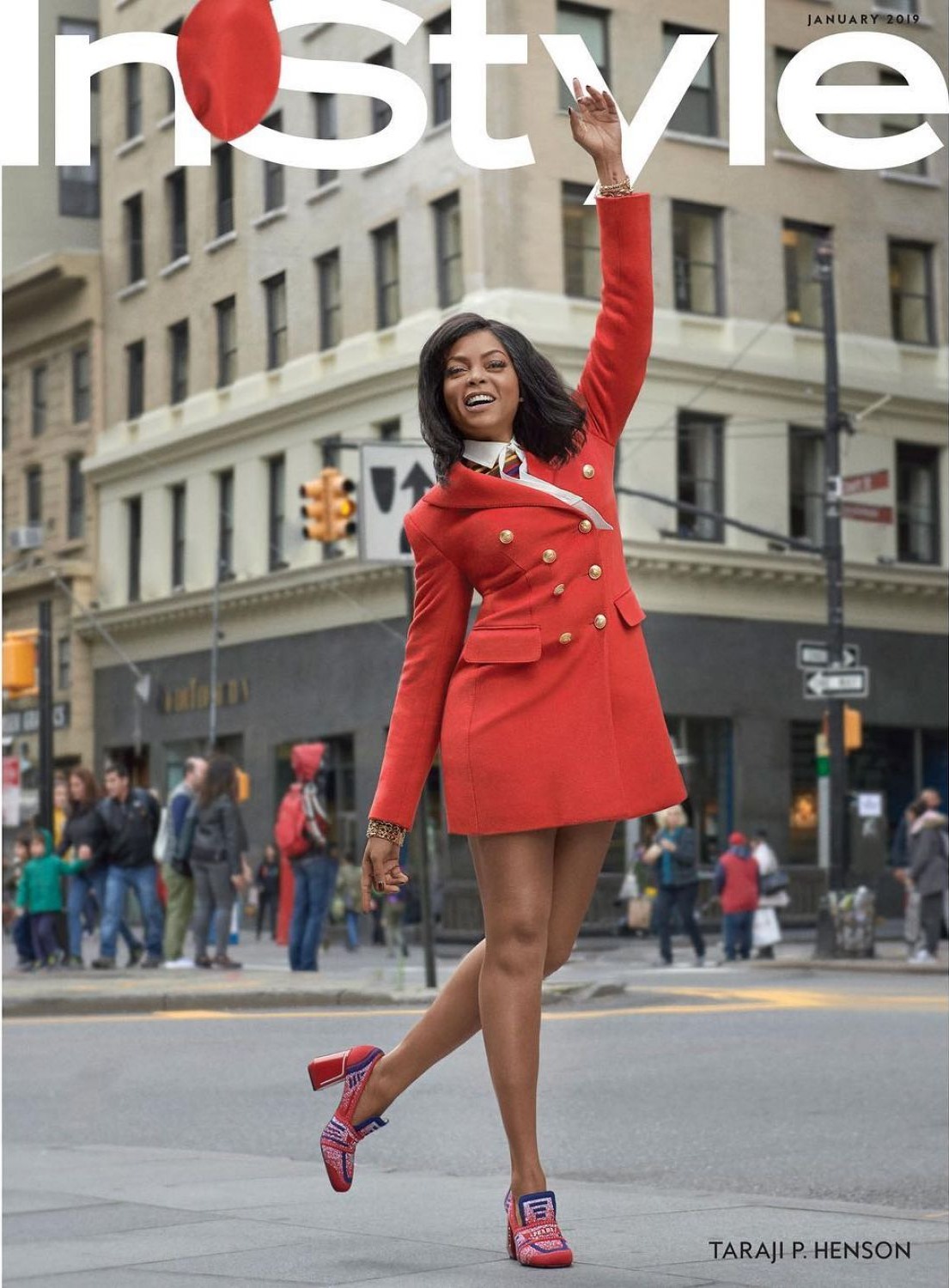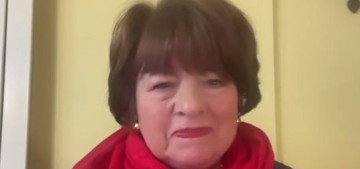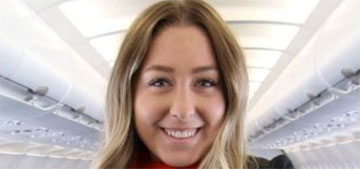Taraji Henson covers the January issue of InStyle to promote What Men Want, the lady-centric version/reboot to the old Mel Gibson movie What Women Want. Taraji not only stars, she’s the executive producer too, and this is her baby. She’s been longing to be the lead of a comedy, and she’s finally there. I love how InStyle styled Taraji for this shoot too – she’s a grown-ass woman and a boss, and that’s how they styled her, to look like an executive or CEO. You can read the full InStyle piece here. Some highlights:
She’s been dying to do a comedy: “I’ve always been the funny girl. Not that I was pigeonholed. They were all great dramatic roles, but I’ve been dying. I just felt so honored and grateful to get a comedy where I could let it all hang out.”
She wants to do more family films: “You know, that’s [audiences buying] four tickets instead of two. That’s generally going to be the largest-grossing film in anyone’s repertoire.”
Taraji knows she sells overseas: “Hollywood executives would tell me that I don’t have fans all the way over there. I said, ‘You’re lying because they can reach me any time. I’m a finger tap away, and they let me know every day.’ Then we go to Paris [to promote Empire], and it’s standing room only in a room with 1,500 seats. I cried. If you believe what people tell you … you can’t let people tell you sh-t.”
She grew up in the “hood”: “I was like the Punky Brewster of the hood. I was a well-rounded kid, but I could also scrap if necessary. But I wasn’t that hard. I still had Strawberry Shortcake wallpaper in my room, and my friend Tracie and I were doing Shakespeare in the Park … and we were in the f—ing hood.”
How Hollywood talks about diversity & then casts white dudes in everything: “Here’s the deal: When you talk about money, don’t you want to make money? I want every walk of life [in my films]. If I could put an alien in, I would. I want their money too. Come on, it’s what the world looks like. That’s what people want to see, representation. That’s all. You can make money doing it. It’s a no-brainer.”
She established the Boris Lawrence Henson Foundation to focus on African-Americans and their mental health needs: “It was born out of necessity. You know, traumatic stuff happened to me and my son. [Her ex-boyfriend, Marcell’s father, was murdered in 2003.] You can’t just pray it away. I don’t care how strong you are. It gets to you, and if you don’t deal with it, it manifests itself in ways you don’t even know. My white friends have standing appointments with their therapists. I was like, ‘Why aren’t we doing that?’ In our culture, it’s taboo.”
On finding her wedding dress: “I’m not going to go through 10,000 dresses. How does it fit? How do I feel? Does it complement me well? Let’s just go with this one. I know what looks good on me. I’m not going to spend 10 hours on a fitting. I hate that.”
She’s a vegan now: She made the jump to veganism after suffering massive stomach pains while filming The Best of Enemies this past summer. “It took a doctor in Macon, Ga., to say, ‘If you don’t change what you’re doing, you’re going to get stomach cancer.’ I said, ‘Say no more.’ So I switched everything up out of necessity. I want to live. Thank God, because I feel so much better.”
She’s open to doing a superhero movie: “The older I get, I want to work smarter, not harder. DC, Marvel, you all can call me!”
Her foundation is named after her dad, who was a Vietnam vet with PTSD. I didn’t know she had started a foundation, but she’s absolutely right that “it’s taboo” in African-American culture to seek mental health treatment. I didn’t know she had gone vegan too – it seems like there should have been some other steps between “you can’t keep eating the way you are” and “go full vegan.” But if she feels better, so be it. And what she says about being told she won’t sell overseas… good lord, that’s some bullsh-t.
Covers courtesy of InStyle.















Slight correction – it’s a taboo for every ethnicity.
But well done for promoting this cause.
#alllivesmatter, right?
it really isn’t. for upper middle class white people it is de rigueur and you’re judged if you’re not in therapy.
@Lizzie
While that’s a funny comment, it’s not even remotely true.
As a black woman who’s had therapy and knows other black people who’ve had therapy, I absolutely don’t think it’s taboo. I think these sorts of comments from black celebs are irresponsible. Might the older demographic of black people shy away from therapy? Sure. But to suggest that therapy is taboo for blacks generally is wrong. You have to factor in class, education, region as well as age when making a sweeping generalization like this. Also, it’s irresponsible to make these comments without offering context about why not as many black people might be in therapy as others. Therapy often requires lots of disposable income, even if you have insurance. Some therapists want you to pay upfront and be reimbursed later. I’m upper middle-class, and even I don’t want to spend hundreds of dollars on therapy and wait for my insurance company to reimburse me later. Then, there’s the fact that most therapists are white, and there are some issues that a non-black therapist wouldn’t understand. Lastly, the fact that the medical industry has a long history of racism makes some blacks wary of seeking out any kind of treatment they don’t perceive to be vital to their health, though mental health is vital, of course. This is a lot more complicated than backwards black people think therapy is taboo, which Henson is implying.
I’m black and I approve this message.
Um Carmen …. you are hilarious. I love this comment. LOVE it.
I am a black, queer, clinical social worker.
I cosign all of what you just said, saying black people don’t get therapy is incredibly irresponsible without the appropriate context, granted I have not read the whole article this excerpt was taken from, so I don’t know if that is in fact what she said. And I totally co-sign the discomfort with trying to relay your struggles to someone who has no way to conceptualize them. As a person who has been in and out of counseling and therapy my whole adult life, and someone who counsels others, I wish everything you said was a basic part of this ongoing conversation.
What you said about therapists. I take care of so many patients who need therapy, want therapy, but on public aid the options are limited and the wait time is unconscionable.
“Then, there’s the fact that most therapists are white, and there are some issues that a non-black therapist wouldn’t understand.”
So much this. I have spent thousands and thousands on therapy, to no avail. Why? Because a lot of my anxiety and depression has to do with racial stress, and white therapists just don’t understand. Most, in fact, made my issues worse. I paid for the privilege of being hit with implicit bias racism for 50 minutes a week. Grrrrrr.
I’ve tried to find a black therapist, but there just aren’t any in my area.
Agreed. My Black mother is a therapist and many of her POC friends/colleagues/ relatives take care of their mental health as much as any other ethnicity.
It’s more taboo in lower economic and lower education levels, but not across any ethnic boundaries.
Um, what was she eating that she was told she would get stomach cancer?
this is gross but – constant indigestion and GERD can damage the stomach and esophagus cells to the point of mutating into cancer. my MIL has had a ton of problems after having her gall bladder out and got the same warning. an ex’d father died from esophageal cancer b/c he was an alcoholic that drank to vomiting for years and constantly had indigestion from drinking. doctors pinpointed that it started at the base of his esophagus from constantly having bile sitting in the bottom of it.
Possibly cured foods but a lot now have nitrites removed.
Alcohol definitely, worse with smoking but nothing to do with vegetarianism.
Overweight has higher linkages to breast and colon cancer.
She looks good. I love her on Empire
That red coat and those shoes! Adorable.
I like that pic as well! And her legs, hawt!
She’s right about it being taboo. There are only a few people I talked to about going to therapy and being on medication. When my dad died suddenly 4 years ago,I was a wreck. Between grieving, working full time, cleaning out his house alone, and dealing with probate, I was a mess. One of my (former) friends would cut me off when I told her I was depressed. “Now don’t get depressed. You just pray” she said. People don’t understand you can do both. You can pray and also see a therapist.
It is taboo in my family and my circle of friends. My daughter started therapy when she was 14 and 2 years after that stated she was suicidal. There are family members on my husbands side that are in therapy and have been committed to mental health institutions . In my family it’s very taboo, we haven’t told any of them about my daughters therapy and suicidal thoughts. I told my best friend and she threw it in my face later stating later at least her son wasn’t sucidal. That hurt me to the core because I thought I could talk to her, she was closer to me than my family but nope she is just as bad. The only bright spot was my mother stated she should have gotten some help when she was younger, this is why our relationship is strained and forever damnaged.
So does she sell overseas? There is a huge difference between having fans and selling. Do people say “I want to see the Taraji B. Henson movie” or even talk about any movie as “Taraji B. Henson movie”? I don’t wanna bring her down or anything like that but people misunderstand selling overseas all the time. For example Liam Neeson, Samuel L. Jackson and Sandra bullock etc. can bomb at the box office but their movies keep making money in streaming and renting. Somebody from overseas won’t even know their names but recognize their faces from the poster and rent it because they know exactly what they are gonna get. Does Taraji B. Henson have a niche? Is she interested in having one?
First of all, her middle initial is P.
Bahahaha!
Yes they do. I know many people who didn’t want to watch Acrimony, but did for Taraji( still have no desire to watch that movie but I wanna see Taraji’s performance). Same as Proud Mary.
There is also the very valid issue of being able to find therapists who are culturally competent and skilled enough to support people who are of diverse ethnic backgrounds. The process of getting your hours for licensing is long and hard and often unpaid which means that it can be prohibitively expensive to complete (and therefore most therapists are still white). A therapist who is only helpful to a certain (white) segment of the (upper middle income) population is dangerous. I have heard several stories from friends (who are women of color) about terrible and f*cked up things therapists have said to them.
It’s not just that there’s a taboo against therapy. It’s also that there’s a concern about being further harmed when vulnerable and seeking support.
@Yup, Me–Thanks for your comment. I’m really curious–what are some of the things your friends who are women of color have heard from therapists?
Why would there have to be “some other steps between “you can’t keep eating the way you are” and “go full vegan.”???? If the way she was eating was making her sick, it was making her sick and she had to change. It’s working for her so whatever. I’m tired of everyone calling veganism extreme. We eat a plant-based diet, and it is keeping us from suffering from totally preventable conditions like heart disease. I’m a little sensitive to this conment today…just coming off of Christmas with my family. And older members who are extremely overweight, suffering from heart disease, borderline type 2 diabetes, taking fistfuls of medications every day and seeing a doctor who HAS NEVER ONCE suggested a dietary change, but keeps on prescribing meds. She was lucky to encounter that doctor. He or she wasn’t afraid to tell it like it is. The standard north American diet will kill you. Sometimes it takes years, but it will kill you. And people will suffer through it and reduced lives until it takes them.
I eat plants and I feel great. And my doubtful doctor ran a ton of tests that proved it was working.
Yes!
I can’t believe it’s almost 2019 and we are still co-signing people make general statement s about an extremely diverse population of people. No, therapy isn’t taboo for all Black | African American | people of African descent in America. It’s taboo for some people for a myriad of reasons. But we don’t all think alike or act alike; it’s a gross over generalization.
This. We are not a monolith. Yes, a significant portion of Black/African Americans do not believe in seeking professional help for mental health issues but an equally significant portion do. And then there is an overlap of those who would seek it but can’t afford it, can’t find the right therapist, right type of mental health care, etc. To reinforce the statement without challenging it, when Taraji’s foundation IS challenging it, is tantamount to saying “all black people can dance.” Well, I’m black, I can’t dance, and I see a therapist.
Well, therapy is a taboo for a LOT of people from a variety of backgrounds. I started seeing a therapist when my marriage was unraveling and while I have a couple of friends who are supportive, it’s surprising how many people are dismissive of therapy. Most of my family thinks it’s very odd that I see a therapist and can’t I just talk with my friends (uh, no).
Interestingly, a lot of those same people would really benefit from therapy (because who wouldn’t) but they refuse to even consider it.
I see a lot of black folks commenting that what she said isn’t true, or is a broad generalization. Obviously, the plural of anecdotes isn’t data, but this middle class black girl, who grew up to be upper middle class, has gotten a world of criticism from family and black friends about seeking treatment for my mental health issues. I can’t count the times I’ve been told that I have the perfect life and nothing to be sad/depressed/anxious about so I should just pull through it.
I had to undo years of social training before I could even reach out for help. And then after I did, I’ve spent years defending myself from family members who think I just wanted a pill to fix everything. No, I wanted medication and therapy to help me manage my brain chemistry.
I’m glad you reached out. I hope it helped.
Yeah I don’t get people being jumpy about her statement. It’s obviously a generalization. If majority of the population hold that view then….*shrug*
Of course there are always gonna be exceptions, but what she says remains largely true. And if therapy is taboo among POC in America, you don’t wanna know how it’s viewed over here in Africa…So disheartening. I like what she said about not just praying, you can do both. I have an uncle who is unravelling. He’s obviously mentally ill but my dad and his brothers won’t take the step of taking him to the hospital. The keep saying that they’re praying for him, that they’re prayers are enough. He’s also a religious person and in his episodes goes on rants about this conspiracy against him, believes everyone is out to hurt him, even the little children around, EVEN his own three children( the oldest is 12). God forbid he finally hurts someone, he gets so worked up in a rage sometimes. I’m so scared.
I heard a highly credentialed psychologist on the radio a few months back who had some interesting thoughts on therapy. He said that the Freudian approach of going over your past is a bit redundant. He explained that if you have the time and money to explore your inner life do it if you want to but when all is said and done we need to let the sediment lie and deal with our lives. Ever since hearing that and trying to put it into practice I’ve felt a lot better.